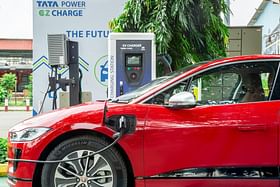As part of the collaboration, Tata Power and ADA will set up EV charging points at various key locations to provide accessible charging facilities for users.
Ayodhya is currently undergoing a significant transformation, as the development of Shri Ram Janmabhoomi Temple is coming closer to its scheduled opening to the public early next year.
In order to promote the adoption of electric vehicles (EVs) in the sacred city of Ayodhya in Uttar Pradesh, the Ayodhya Development Authority (ADA) has partnered with Tata Power to establish EV infrastructure within the city.
Ayodhya is currently undergoing a significant transformation, as the development of Shri Ram Janmabhoomi Temple is coming closer to its scheduled opening to the public, early next year.
Known for its religious significance and popularity as a tourist destination, Ayodhya attracts many visitors from across the world.
The Uttar Pradesh government, and ADA have been spearheading infrastructure and planning advancements in the city to ensure development of a modern yet, traditional and culturally rich religious centre.
As part of the collaboration, Tata Power and ADA will set up EV charging points at various key locations. This includes Survya Kund parking, Guptar Ghat, Amaniganj multi-level parking (MLCP), Kaushesh Kunj MLCP parking near Ayodhya railway station, and Tedhi Bazar MLCP parking on the east and west sides of Ayodhya.
Additionally, EV charging points will be installed at the Collectorate Office parking in the city.
This collaboration aims to address the need for better EV charging infrastructure in Ayodhya as the country moves towards faster EV adoption.
The official Memorandum of Understanding (MoU) signing ceremony took place in Ayodhya on 28 June, reports Times of India.
Vice chairman of ADA emphasised the significance of this collaboration, stating, “This partnership is a significant milestone in promoting sustainable mobility in our pilgrimage city. By establishing EV charging infrastructure in public parking locations, we are not only providing convenient and accessible charging facilities for electric vehicle users but also highlighting our commitment to environmental preservation in a city of immense religious importance.”
The VC added, “Joining hands with Tata Power aligns with our vision of transforming Ayodhya into a cleaner and greener spot, ensuring a sustainable future for pilgrims and tourists, and contributing to the state’s holistic approach towards promoting EV adoption.”
The Uttar Pradesh government is actively promoting EV adoption by offering a 3-year tax and registration fee exemption for EV purchases.
Moreover, EVs manufactured within the state receive a 5-year exemption, further encouraging the growth of local EV manufacturing and supporting the state’s economy.
At present, Tata Power has installed 110 public and semi-public charging stations in Uttar Pradesh.
With a market share of nearly 60 per cent, Tata Power operates in 350 cities and is constantly expanding the country’s EV charging infrastructure.


